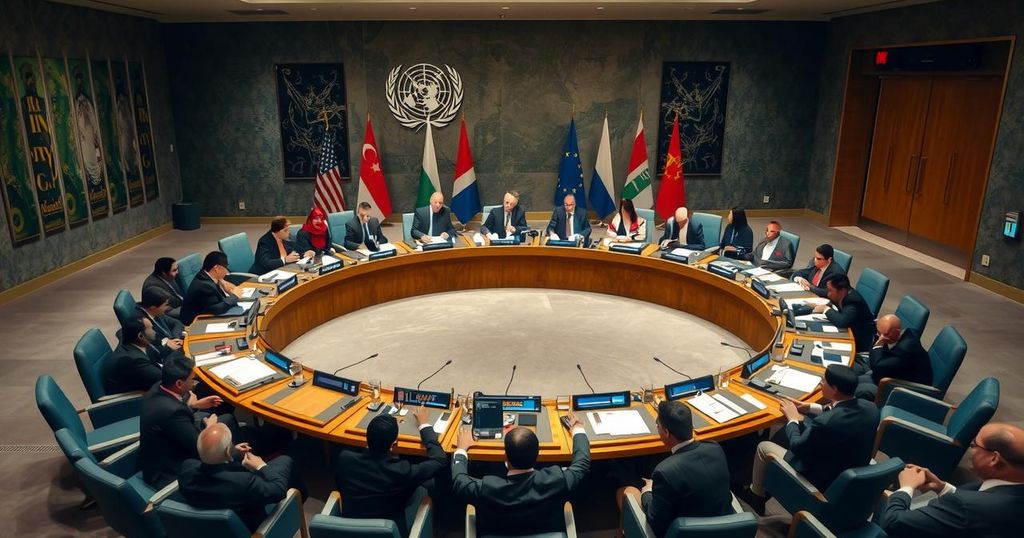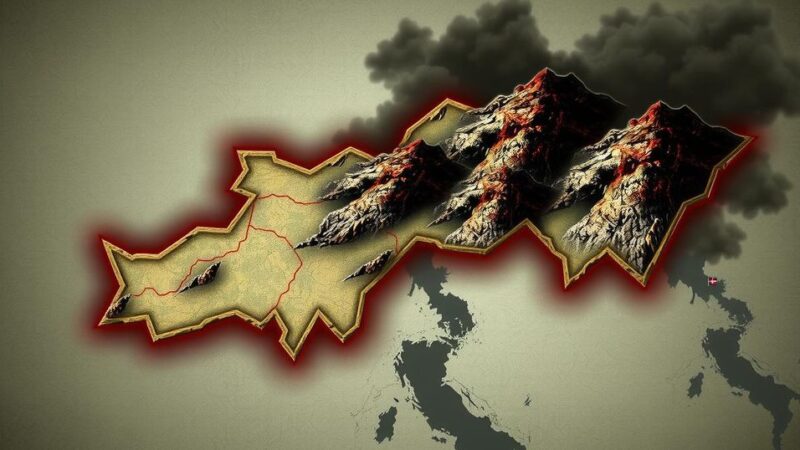The United Nations Security Council is set to meet on Monday to discuss Israel’s recent airstrikes on Iran, which have heightened tensions in the region. The meeting was requested by Iran with support from Algeria, China, and Russia. Israel’s actions follow Iran’s missile attacks on Israeli territory, amidst ongoing conflicts involving regional actors. There are calls for a cease-fire in the Israeli-Hamas conflict, along with increasing diplomatic efforts for resolution.
The United Nations Security Council is scheduled to convene an emergency meeting on Monday to address escalating tensions in the Middle East, following Israel’s recent airstrikes on Iranian sites. This session was called at the request of Iran, supported by Algeria, China, and Russia. In a communication to the 15-member council, Iran’s Foreign Minister, Abbas Araqchi, emphasized that Israel’s military actions pose a serious threat to global peace and exacerbate regional instability. The attacks, executed by Israeli jets on Saturday, involved multiple airstrikes targeting Iranian missile production facilities. This military response follows Iran’s launch of approximately 200 ballistic missiles aimed at Israel, amid ongoing conflicts involving Iranian-affiliated groups, Hamas and Hezbollah, in both Gaza and Lebanon. Iran’s Supreme Leader, Ayatollah Ali Khamenei, responded cautiously, stating that the attacks should not be overstated or minimized but refrained from advocating for direct retaliation. Conversely, Israeli Prime Minister Benjamin Netanyahu asserted that the military operations effectively impaired Iran’s defense capabilities and missile production. Amid this turmoil, Iraq has lodged a formal complaint with the United Nations regarding Israel’s utilization of its airspace for the strikes against Iran, underscoring violations of national sovereignty. On the ground, Israeli forces conducted further airstrikes in southern Lebanon, resulting in civilian casualties. Furthermore, Egyptian President Abdel-Fattah el-Sissi proposed a two-day cease-fire in the ongoing Israel-Hamas conflict, advocating for humanitarian assistance to affected Palestinians and the release of hostages by Hamas during this truce. However, neither party has responded to this initiative at present. Additionally, discussions are underway involving high-ranking officials, including Mossad Chief David Barnea, who travelled to Doha for talks alongside Qatari and U.S. representatives, symbolizing ongoing diplomatic efforts amidst escalating hostilities. This current outbreak of violence was triggered by the fatal assault led by Hamas on October 7, 2023, resulting in significant fatalities and hostage situations. As of now, the conflict has claimed the lives of nearly 43,000 Palestinians, according to health officials in Gaza.
The emerging tension in the Middle East follows a series of military confrontations primarily between Israel and Iranian forces, with significant implications for regional and international security. Since October 7, 2023, when Hamas initiated an aggressive attack on Israel, the conflict has intensified, leading to subsequent military responses and retaliatory actions by Israel, including airstrikes targeting Iranian capabilities. The UN Security Council meeting reflects the global concern regarding the stability in the region and the potential for a broader conflict, as multiple nations are now involved either through direct action or diplomatic intervention. The dynamics of the situation are compounded by the humanitarian crisis unfolding in Gaza and the regional complexities introduced by the involvement of various state actors, including Iraq, Egypt, and Iran, along with their various alliances and hostilities.
The United Nations Security Council’s upcoming meeting highlights the urgent need to address the repercussions of Israel’s military actions against Iran, which have significant implications for regional stability. The international community is now grappling with the aftermath of escalating violence, humanitarian concerns, and the potential for further conflict. Continued dialogue and negotiations are essential in light of the severe humanitarian consequences of the ongoing war between Israel and Hamas, and efforts to mediate a ceasefire are increasingly vital to prevent further loss of life and to facilitate humanitarian aid. As the situation remains fluid, the actions taken by the Council and involved nations could prove pivotal in shaping the future landscape of the Middle East.
Original Source: www.voanews.com






